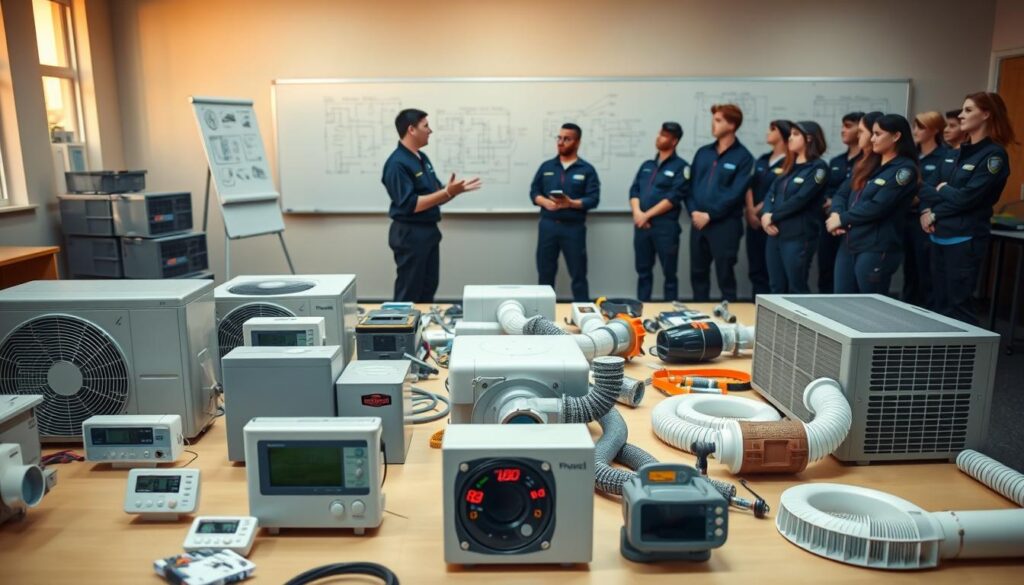Affiliate Disclosure
HVAC Guide Guys is a participant in the Amazon Services LLC Associates Program, an affiliate advertising program designed to provide a means for sites to earn advertising fees by advertising and linking to Amazon.
Are you ready to dive into a career that keeps America comfortable and running smoothly? Learning how to get into HVAC trade might be your ticket to a stable and rewarding professional path. It combines technical skills with real-world problem-solving.

The heating, ventilation, air conditioning, and refrigeration industry offers incredible opportunities. Those willing to invest in their technical education and hands-on training will find it rewarding. Skilled HVAC technicians are essential in maintaining comfortable environments in homes, businesses, and critical infrastructure across the United States.
By exploring how to get into HVAC trade, you’ll discover a dynamic career. It provides job security, competitive wages, and the chance to work with cutting-edge technologies. Whether you’re a high school graduate or considering a career change, the HVAC industry welcomes motivated individuals ready to build a promising future.
Key Takeaways
- HVAC trade offers stable career opportunities with strong growth potential
- Technical education and hands-on training are crucial for success
- Competitive wages and job security make HVAC an attractive career path
- Multiple entry points exist for individuals with different backgrounds
- Continuous learning is essential in this evolving technological field
Table of Contents
Understanding the HVAC Industry and Career Prospects
The HVAC industry is full of exciting opportunities for those who want to become HVAC technicians. It combines technical skills, problem-solving, and hands-on work. This keeps buildings comfortable and efficient.
Daily Responsibilities of HVAC Technicians
HVAC technicians are key to keeping buildings comfortable. Their daily tasks include:
- Installing heating and cooling systems
- Performing routine maintenance on equipment
- Diagnosing and repairing mechanical issues
- Testing system performance
- Consulting with clients about energy efficiency
Industry Demand and Growth
The job market for HVAC technicians is growing fast. New buildings and a focus on energy-efficient systems create many job opportunities.
| Industry Sector | Projected Growth (2022-2032) |
|---|---|
| Residential HVAC | 5.5% |
| Commercial HVAC | 7.2% |
| Industrial HVAC | 6.8% |
Salary Expectations
HVAC technicians earn competitive salaries that grow with experience. Beginners start around $40,000 a year. Experienced ones can make up to $75,000 or more.
Explore Our HVAC Shop
Looking for top-rated HVAC tools, parts, and accessories? Visit our shop and find the perfect solution for your needs.
Visit the ShopBasic Educational Requirements for HVAC Career
Starting your HVAC career doesn’t need a four-year college degree. The path is simple and open to those who love technical work.
To begin, you need a high school diploma or GED. This education gives you the math, physics, and technical skills needed for HVAC techs.
- High school diploma or equivalent
- Basic mathematics understanding
- Strong problem-solving skills
- Physical fitness and manual dexterity
After high school, you can get specialized training at vocational schools or community colleges. These places teach you about heating, ventilation, air conditioning, and refrigeration systems.
| Educational Path | Duration | Key Learning Areas |
|---|---|---|
| Technical School Program | 6-24 months | System design, electrical theory, refrigeration principles |
| Community College Certificate | 1-2 years | Advanced technical skills, business fundamentals |
| Apprenticeship Program | 3-5 years | Hands-on training, professional mentorship |
Your education is the first step to a great HVAC career. Pick the program that fits your goals, schedule, and learning style.
How to Get Into HVAC Trade: Essential First Steps
Starting a career in HVAC needs careful planning and preparation. Knowing the first steps can guide you into this exciting field.
Getting into HVAC involves several important steps. These steps will help you start your journey in this rewarding field.
High School Diploma or GED Requirements
First, you need a high school diploma or GED. Schools and employers see this as a basic requirement. It’s the first step to technical training.
- Complete high school or obtain a GED
- Maintain good academic standing in math and science courses
- Consider taking technical electives if available
Basic Skills Assessment
HVAC technicians need special skills. A skills assessment checks if you’re a good fit. Key skills include:
- Strong mechanical reasoning
- Physical stamina
- Problem-solving capabilities
- Attention to detail
“Technical skills can be learned, but passion for the trade is your greatest asset.” – Professional HVAC Instructor
Initial Career Planning
Creating a career plan is key. Research local job markets and connect with professionals. Look for training programs that match your goals.
- Network with current HVAC professionals
- Attend trade school information sessions
- Research apprenticeship opportunities
- Understand local certification requirements
By following these steps, you’ll lay a strong foundation for your HVAC career. Dedication, preparation, and ongoing learning are essential for success.
Explore Our HVAC Shop
Looking for top-rated HVAC tools, parts, and accessories? Visit our shop and find the perfect solution for your needs.
Visit the ShopHVAC Trade Training Programs and Options

Exploring hvac trade training programs opens up exciting career opportunities. The heating, ventilation, and air conditioning industry is dynamic. Your path to becoming an HVAC technician can take multiple routes, each offering unique advantages for aspiring professionals.
Traditional trade schools provide comprehensive hvac trade training programs. These programs equip you with essential skills and knowledge. They usually last from 6 months to 2 years and cover critical areas such as:
- Electrical systems
- Refrigeration principles
- HVAC equipment maintenance
- Energy efficiency techniques
Alternative training options have emerged for those seeking flexibility. Online courses and community college programs offer innovative ways to learn technical skills. They do this without traditional classroom constraints.
| Training Program Type | Duration | Key Benefits |
|---|---|---|
| Trade School Programs | 6-24 months | Structured curriculum, hands-on training |
| Community College | 2 years | Associate degree, broader education |
| Online Certification | 3-6 months | Flexible scheduling, self-paced learning |
Pro tip: Always verify that your chosen hvac trade training programs are accredited. This ensures quality education and future employability.
Some professionals start their journey through on-the-job training. By showing enthusiasm and aptitude in existing workplaces, you can transition into entry-level HVAC roles.
Essential Certifications and Licenses
Understanding HVAC trade certification is key to starting and growing your career. Professional certifications show your skills and dedication. They open doors to better jobs and higher pay.
Getting the right certifications is vital for HVAC technicians. These credentials prove your skills and meet industry standards.
EPA 608 Certification: A Mandatory Credential
The Environmental Protection Agency (EPA) 608 Certification is a must for HVAC pros working with refrigerants. It comes in four types:
- Type I: Small appliances
- Type II: High-pressure appliances
- Type III: Low-pressure appliances
- Universal: Covers all refrigeration systems
State-Specific Licensing Requirements
Each state has its own rules for HVAC technicians. You must check and follow your state’s laws to work legally.
| State | Licensing Requirement | Exam Needed |
|---|---|---|
| California | C-20 HVAC License | State Trade Exam |
| Texas | HVAC Contractor License | Business and Trade Exam |
| Florida | Certified Mechanical Contractor | Comprehensive Exam |
Additional Professional Certifications
There are more certifications beyond the basics that can boost your career:
- North American Technician Excellence (NATE) Certification
- HVAC Excellence Professional Level Certification
- ASHRAE Professional Certifications
“Continuous learning and certification are the keys to success in the HVAC industry.” – HVAC Industry Expert
Investing in your professional growth through certifications will make you stand out in the HVAC job market.
HVAC Apprenticeship Programs: Structure and Requirements
HVAC trade apprenticeships are a great way to start a career in heating, ventilation, and air conditioning. They mix hands-on training with classroom learning. This gives you a solid foundation for your future in the field.
These apprenticeships have a clear plan for learning skills:
- Practical hands-on training with experienced professionals
- Technical classroom instruction
- Gradual progression from entry-level tasks to advanced skills
- Supervised work experience in real-world settings
Most HVAC apprenticeships last 4-5 years. This time lets you learn the key skills needed to become a certified HVAC technician.
| Apprenticeship Component | Typical Hours/Duration |
|---|---|
| On-the-Job Training | 6,000-8,000 hours |
| Classroom Instruction | 500-720 hours |
| Total Program Duration | 4-5 years |
To start an HVAC apprenticeship, you need a high school diploma or GED. You should also have basic math and science skills and a good mechanical sense. Many programs ask for an initial skills test and background check.
Through your apprenticeship, you’ll grow from a beginner to a skilled HVAC technician. It’s a structured way to a fulfilling and stable career in the trade.
Explore Our HVAC Shop
Looking for top-rated HVAC tools, parts, and accessories? Visit our shop and find the perfect solution for your needs.
Visit the ShopTransitioning from Other Trades to HVAC
Becoming an HVAC technician is a great career move for many. It’s a field that’s always changing and has lots of job openings.
If you’re thinking of switching to HVAC from another trade, you’re off to a good start. Skills from other trades often fit well in HVAC work.
Transferable Skills from Related Fields
Many trades offer skills that are useful in HVAC:
- Electricians know about electrical systems and wiring.
- Plumbers are skilled in pipe connections and fluid dynamics.
- Mechanical workers understand complex systems.
- Construction workers are familiar with building structures.
Retraining Opportunities
There are many ways to become an HVAC technician:
- Community college certificate programs
- Vocational training courses
- Apprenticeship programs
- Online technical training
Career Change Success Stories
“My background in electrical work made transitioning to HVAC smooth. The technical skills transferred perfectly,” says Michael Rodriguez, a successful HVAC technician.
Your current trade skills can really help when you switch to HVAC. With hard work and the right training, you can make a successful career change.
Advanced HVAC Technologies and Specializations

The HVAC industry is changing fast with new technologies. These innovations are changing how HVAC professionals train. Digital advancements are making heating, ventilation, and air conditioning work different.
Today’s HVAC technicians work with complex systems. They do more than just control temperatures. They use Building Automation Systems (BAS) and Building Management Systems (BMS) to manage buildings.
- Smart building technologies
- Remote diagnostic capabilities
- Energy efficiency solutions
- Renewable energy system integration
To succeed in HVAC training, you need to learn digital skills. You must know how to:
- Program advanced control systems
- Connect to networks
- Analyze and interpret data
- Keep building systems safe from cyber threats
| Specialization | Key Skills Required | Growing Demand |
|---|---|---|
| Green HVAC Systems | Sustainable design knowledge | High |
| Smart Building Integration | Digital system management | Very High |
| Industrial HVAC | Complex system troubleshooting | Moderate |
Continuous learning is no longer optional—it’s essential for staying competitive in the rapidly changing HVAC landscape.
Explore Our HVAC Shop
Looking for top-rated HVAC tools, parts, and accessories? Visit our shop and find the perfect solution for your needs.
Visit the ShopBuilding Your Career Path in HVAC
Becoming an HVAC technician opens up many career paths. You can start from the bottom and work your way up. You might even become a business owner.
As you move up in your HVAC career, you’ll find different ways to grow:
- Technical Specialization
- Management Positions
- Business Entrepreneurship
Climbing the Professional Ladder
Your first job sets the stage for your future. HVAC technicians can:
- Get specialized certifications
- Learn advanced technical skills
- Take leadership training
Entrepreneurial Opportunities
Many HVAC pros start their own businesses. You can:
- Start your own HVAC company
- Buy an HVAC franchise
- Offer consulting services
Keep learning and networking to succeed in HVAC. Staying committed to your skills can turn a starting job into a successful career.
Conclusion
Starting a career in the HVAC trade is both exciting and stable. It requires dedication, planning, and a commitment to learning new skills. The industry offers many chances for those who are willing to learn and get hands-on experience.
Your success in HVAC depends on several important steps. First, complete a thorough training program. Then, get essential certifications like EPA 608. Also, take part in apprenticeships to build a strong base.
The demand for skilled HVAC technicians is growing. This means you can look forward to a promising career with chances for growth and specialization. As technology advances, the HVAC industry changes too. Keeping up with new technologies and green solutions will make you stand out.
Begin by looking into training programs and talking to industry experts. Work on developing both technical and people skills. Your journey in this vital and changing industry begins today.

